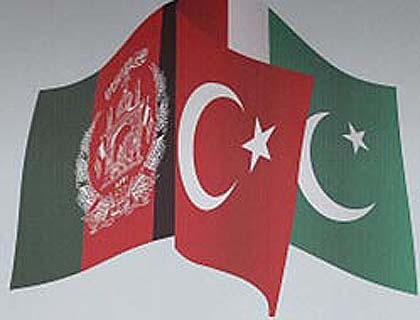Regional cooperation is rightly upheld as essential for stabilizing Afghanistan and bringing an end to this long-standing conflict. It was the main theme of the Istanbul Conference on Afghanistan. The outcome of this conference has been enhanced understanding among the regional countries, including the neighbors of Afghanistan, regarding the imperative of working together towards resolving the common problem of instability and conflict in Afghanistan.
Afghanistan and Pakistan have reaffirmed their commitment to working alongside each other to address the outstanding issue of militant safe havens in the tribal areas and border regions. Even in the upcoming Bonn Conference in early December, regional cooperation is said to be the mainstay of the talks and negotiations with the U.S. pushing for greater involvement of Pakistan and other countries in the so-called "end-game" in Afghanistan.
Stressing the importance of regional cooperation by the stakeholder countries is, per se, something extremely positive but in actuality just how much is the goal of bringing about greater regional cooperation on the Afghan issue feasible? Achieving the goal of enhanced strategic cooperation in our neighborhood is, however, easier said than done.
While in other parts of the world from Latin America to South East Asia and Far East, various countries are already in advanced stages of exploring avenues for increasing multi-lateral cooperation in many fields, our region in which our country is located is still frozen in a traditional mindset with countries viewing relations with neighbors as essentially zero-sum games in which gain for one is considered to be loss for the other.
Apart from the cut-throat traditional rivalries between India and Pakistan, even the central Asian republics have relatively little cooperation with one another despite the fact that they all share overwhelming cultural, linguistic and social linkages and commonalities.
Iran and Afghanistan, as two neighbors with shared history, culture, language and history are kept cut off from one another with the two countries and governments being on the two separate ends of the spectrum when it comes to pursuing national interests.
For example, for an Afghan from the city of Herat close to the border with Iran, it would be much easier to apply and obtain a Russian visa than an Iranian visa. Barriers and obstacles in people-to-people and government-to-government relations are still overwhelming. As far as shared cooperation on issues of multi-lateral importance is concerned, our region, unfortunately, ranks poorly in comparison to other countries and regions where regional cooperation is gaining currency.
The visible and invisible walls of distrust and mistrust and chronic phobia towards one another continue to dominate the inter-state relations in our region. Countries such as Turkey and conferences such as the one in Istanbul of a few days ago strive to give a push to a greater degree of regional cooperation on the most important issue of our time that is the instability and conflict in Afghanistan.
These efforts by Turkey and other countries should be appreciated, but It is difficult to see how such conferences and outside intermediations can be of any meaningful impact on breaking the diverse sets decades-old barriers and obstacles that have so firmly prevented the countries in our region from opening up to one another.
While it is an undisputable fact that greater regional cooperation, dialogue and consultation are key to the goal of stabilization of Afghanistan, the desperately-needed cooperation and genuine dialogue cannot be simply forced upon these countries by outside countries and powers.
In the cases of Iran and Pakistan and over the past one decade, there have been a number of major irritants that continue to keep their bilateral relations with Afghanistan on the boil. These major irritants also have worked to prevent a sense of good neighborhood from prevailing in regional relations.
In the case of Iran, the fallout from the decades-old Iranian-American hostilities continues to play itself out inside Afghanistan as it is in Iraq, Palestine and elsewhere. The regime in Iran continues to view an Afghanistan beholden to America and other Western powers as a major regional threat to its long and short-term security.
The government of President Karzai as well as Afghanistan's diplomatic apparatus have so far miserably failed in taking credible steps towards assuaging and lessening the Iranian regime's fears and phobias. For example, in relation to the issue of American long-term military presence on the Afghan soil, the only statement that Afghan leadership has parroted over and over again has been that "Afghanistan will not allow Western powers to use the Afghan soil against any country in the region".
For our neighbors Iran and Pakistan, these assurances would sound hollow given the fact that the Afghan government, as a client state of the U.S. and NATO, is even unable to maintain security and order in its capital and largest city.
In the case of Afghanistan-Pakistan relations, the unresolved issue of the shared borderline is a major irritant in relations although it is only one among many such outstanding issues. For Pakistan, it is an existential issue and the government of Afghanistan must understand and respect its neighbor's genuine concerns.
Perhaps, before Afghanistan and Pakistan can find themselves in a position to genuinely commit themselves to bilateral cooperation of the sort that the U.S. and the Istanbul conference insist on, it would be essential to sort out and resolve this outstanding issue in an amicable manner with the help of the international community. A problem, certainly, cannot be tackled and resolved simply by turning away from it.
The baggage of problems, distrusts and a host of unresolved issues, as legacies of the colonial era and afterwards, continue to weigh heavily on Afghanistan's relations with its immediate neighbors. The U.S., Turkey and other members of the international community who are making frantic efforts to persuade Afghanistan and its neighbors to commit themselves to genuine cooperation, better be mindful of these regional legacies.

